He walked up to the debris and tapped on it with his cane.
“See, you hear that? Come down and clear away this piece of wall for me, it’ll be easier to hear.”
“What will be easier to hear?”
“You don’t get it. I sometimes come here, I sit in the ruins and listen. There, you hear that? If you’d only move this piece of wall. Come down. You’re young, you’ll be able to do it.”
I went there almost every Sunday and helped him dig out the organ. That’s to say, he sat by me and I did the digging. Every now and then he’d stand and try to pick some piece up, but the moment he leaned over he’d lose his balance. In the end I told him to stay put, I’d do the clearing myself. He hardly said a word, didn’t ask any questions, maybe he was listening. Because when I moved some bigger piece of rubble he would always repeat:
“Now you can hear more clearly. Dig over there now.”
One day I’d been digging and digging till I’d uncovered the keyboard. I sat down, tired, and he said:
“We’re close now. Listen.”
I swear I couldn’t hear a thing. I asked:
“Close to what?”
“God,” he said, “Close to God. God is music, only after that is He the Almighty.”
One Sunday I came as usual, looked around, I couldn’t see him. He would always be there before me, sitting in the ruins and waiting. The next Sunday I didn’t see him either. Or the next. I cleared away the whole organ. As you can imagine, it was nothing but wreckage. I gathered up the tiniest parts. But he never came back. Maybe he’d had the good fortune to die before I dug out the organ. Because if he’d seen it …
What happened after that? After that it snowed. That much you know. How do you know I hid in the potato cellar? I didn’t hide, mother sent me in the morning with a basket to fetch potatoes. The zurek soup was already on the go, she’d put the potatoes in and for sure what was in the pot would have been enough. But she suddenly decided it wouldn’t do. Get the basket and bring a few more, son, I’ll peel them and pop them in. She always liked to make big amounts of everything, because you never knew who might show up hungry. And if not, it would still get eaten.
It took a while for me to fill the basket, then clamber up to the little door of the cellar, the place was deep and I wasn’t that strong, I had to go one step at a time, first lift the basket onto the next step up and only then climb after it. I’d almost reached the door, I had one more step to go, when out of the blue I heard shots. I put my eye to a crack in the door and I saw soldiers running and shouting, pouring something from canisters all around the house and the barn and cattle sheds. I let go of the basket, it crashed back into the cellar. Instead of rushing out and running back to the house, I hunched over till my head touched my knees. I shut my eyes, covered my ears with my hands, and sat there not hearing and not seeing.
Let me tell you, to this day I can’t understand my own behavior. I can’t forgive myself. No, it wasn’t what you think, it wasn’t fear. Fear would have driven me out of the cellar. Fear would have made me hear my heart, but in my case my heart stopped. I couldn’t hear the least murmur through the hands over my ears. I was all numb.
I don’t know how long I sat like that, like I’d frozen for good in that position, hugging my knees, hands pressed to my ears. I don’t even know when I fell asleep. Can you imagine that, I fell asleep. Is that normal? True, I’d never liked getting up early in the morning, I always had a hard time waking up. Even when I could hear mother leaning over me and saying, Come on son, get up, it’s time, even then I could never wake up. So more often than not it would be father who came to wake me up. He’d pull the covers off of me and say loudly, Come on, on your feet or I’ll pour cold water over you! After that I’d walk around still sleepy for the longest time. I’d wash and get dressed in a daze. We’d have breakfast and I’d still be in a daze. They’d have to keep reminding me to eat instead of falling back asleep. I’d still feel sleepy when I went to school. Often, the schoolteacher would finally wake me during the first lesson. Or in vacation time, when I led the cows down to the pasture it was more like they were leading me, and I was following behind, still asleep.
Anyway, when I woke up everything was covered with snow. I’d never seen snow like that before. You have no idea. The trees were a third buried in snow. Nearby in the orchard there was an old beehive that the bees had left. Father had been planning to set up a new bee yard, he kept promising himself. The hive was completely covered in snow. It was coming down in big flakes, it was so dense you could barely see anything at all. And it kept falling. You had to peer through it like you do with fog. We’d not had snow all winter. There’d been frosts, but not a hint of snow. When it had started I couldn’t tell you. But it was only when it stopped that you could see how thick it lay. It came up to more than half the height of the cellar door. Luckily the crack I could see out of was right at the top of the door. The snow shone so brightly it was hard to see through the crack.
Snow like that changes the world. For instance, when you walk through the woods among the trees all heaped with snow, you really feel like just lying down under one of the trees. Especially when it falls in big flakes, even if it were going to cover you up, you’d still lie down. Why not? Is it so difficult to imagine you’re lying there in bed, in the sheets, under a fluffy quilt, plus no one’s waking you up, while here over your head there’s, let say, a happy fir tree. That’s right, trees can be happy or unhappy too, it can happen. Like people, they’re not so different from us. I can see you don’t believe me. Let me tell you, when I was little I could tell at a glance which trees were happy and which ones weren’t. When I went berry-picking or mushrooming with mother, she’d be looking for berries or mushrooms, whereas me, I’d be looking at the trees and seeing which ones were happy and which were unhappy. Often I’d call her over to come take a look, she really had to see. She’d come away from her berries or mushrooms, thinking something must be wrong. But she never told me I was talking nonsense, that I’d taken her away from her berries or mushrooms for no reason. Try and imagine this: two oak trees next to each other, both of them just oaks, but one of them is happy, while the other one is kind of stock still in its distress. On the first tree the leaves are all atremble with the joy of life, on the other one they look like all they want to do is fall off.
These days I can’t tell which is which. I often walk a good ways through the woods, but I can’t figure it out. They all look the same to me, and whether a tree’s happy or unhappy, I can’t say. Often I’ll take the dogs out and watch to see if they know. But neither of them so much as sniffs at a tree. How can I get them to? What are they even supposed to sniff for — to see which trees are happy and which ones aren’t? You’d have to explain to them what that meant. The thing is, no one knows. Besides, the woods themselves may mean something different to dogs. In any case, for me they’re no longer the same woods.
When I got cold looking through the crack, I went back down to the bottom of the cellar. It was much warmer down there. I slept there, ate there. Oh, there was plenty to eat. Not just potatoes. Carrots, beets, cabbage, turnip. When I was thirsty, I drank snow. I managed to push the door open a tiny bit, just enough to reach out my hand and get a handful of snow.
I didn’t count on anyone finding me there. To be honest, I didn’t want anyone to find me. Besides, who could it have been? The whole place was deserted, silent, nothing but the snow. You’ll find this hard to believe, but I was actually beginning to feel comfortable there. I felt the way I did when I was lying in the bottom of the boat in the reeds, and they’d be calling me, father, mother, my sisters, and I’d pretend not to hear. I’d imagine them scolding me later, Where on earth were you? You’re nothing but trouble. We were calling and calling.
Читать дальше












